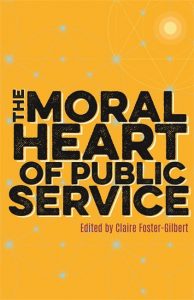The Moral Heart of Public Service – Edited by Claire Foster Gilbert Jessica Kingsley Publishers (2017) ISBN 9781785922558 £18.99
Westminster Abbey takes its location to serve our national life with utmost seriousness. As well as attracting visitors from across the world the Abbey also seeks to engage with a range of major institutions and public figures, not least the British Parliament.
The Westminster Abbey Institute was founded in 2013 to build and develop mutual concern about the world we live in and what values might shape policy and politics. This volume of essays, carefully organised offer insight into the shape of some of these conversations.
Claire Foster Gilbert is a reflective, engaged and creative public theologian. She sets the scene in the introduction by outlining the shape and content of the book:
‘The essays and dialogues can be read individually or as a collection. They will appeal in different ways. None is intended to moralise, rather to share the skill, the effort, the camaraderie and the humour involved in making robust moral decision, in everything that is involved in sailing the ship wards a good destination, which should, after all, be seen as a profound and defining human endeavour for us all’ (p23)
The first essay, by the former foreign secretary William Hague explores the role of Britain as a moral force on the world stage. He asks us to think about our political vocation has one of service to the international community. There is a refreshing questioning of dogma and a restless openness in his reflections.
Three essays follow, written by Foster Gilbert, with a practical focus offers a framework for moral decision-making with some measure of sophistication and subtlety as the text reminds us that almost all decisions cannot claim moral perfection or indeed understand the consequences of the decisions that we make. There is in the process both virtue and truth but an implicit call for a deeper reflectiveness on analysis, perception and practice. This section of the book asks us all to consider how we nurture moral character.
Mary McAleese, the former president of Ireland is in dialogue with John Hall the Dean of Westminster in a chapter which explores building communities (p93). This need for reconciliation and the absolute necessity for emotional intelligence as we engage with one another is failings offers a deeply attractive appeal to the nurture of shrewdness and humanity. These are so often qualities lacking in some of public life including within our religious organisations.
Vernon White, Canon theologian at Westminster Abbey, offers three pieces, in a section entitled idealism and compromise. How do we live up to our convictions and ideals in a way which understands human fallibility and limitedness? There is a subtlety and depth to White’s writing which demands careful attention.
One of the great public thinkers of our nation, Rowan Williams, offers a reflection on the relevance of Benedict and his example and teaching in the public space of Parliament Square. Benedictine values in public life are then explored by Vernon White (stability) Andrew Tremlett (community) and Claire Foster Gilbert (the conversion of manners). The flow of this text in narrative is carefully integrated across the social, political, cultural, theological and spiritual worlds within which we all move.
Finally, one of our great political historians, Peter Hennessy is featured in conversation with Claire foster Gilbert, which took place during the profoundly destabilising political events of 2016. Here we see the value of a wise and reflective historian infused with a quiet confidence in the abiding transformation of spiritual values.
In the light of this positive review it would seem churlish to pick at (perhaps) obvious limitations ? However there are fundamental questions to be asked about the traction and purchase of such dialogue and reflection. Whose voices matter? Who do we listen to ? Where does power lie? What are the dangers of class complacency as public service is a matter (literally) of life and death for some. How far does our context collude with our view of what might need changing in order to really recover a moral heart? In a nation so divided geographically what hope might there be for a greater diversity of colour, age, sex and experience and an attention to their narratives?
This is of course too much to ask for – but the book stimulated these questions about what needs to change and how it might change. Dialogue and reflection, are important but only one step in building a better future where there is justice, equality and freedom for all.
Jessica Kingsley has done us a great service in publishing this book. It is to be hoped that those of us taken by its quality and depth might find ways of helping individuals and communities access both its content and the quality of its reflectiveness.
Professor James Woodward
Principal of Sarum College
www.sarum.ac.uk
